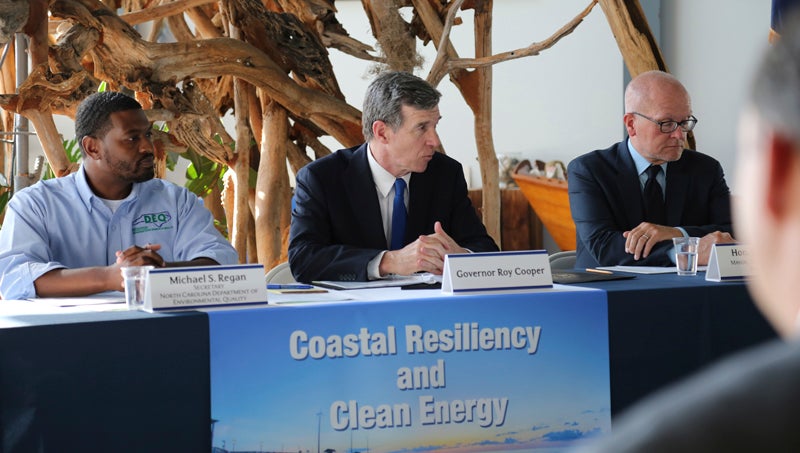Governor, local mayors talk hurricane resilience, clean energy
Published 7:02 pm Tuesday, September 24, 2019

- BRAINSTORMING: N.C. Secretary of the Department of Environmental Quality Michael Regan, N.C. Gov. Roy Cooper and Nags Head Mayor Ben Cahoon speak with local leaders about hurricane resilience, clean energy and climate change during a roundtable discussion at the North Carolina Estuarium on Monday. (Office of Governor Roy Cooper)
Coastal resiliency, clean energy and climate change were the topics of conversation Monday, as the North Carolina Estuarium hosted Gov. Roy Cooper, N.C. Department of Environmental Quality Secretary Michael Regan and local officials for a roundtable discussion of the issues.
A number of local officials from Beaufort County attended the meeting, including Beaufort County Board of Commissioners Chair Jerry Evans, Washington Mayor Mac Hodges, Washington City Manager Jonathan Russell and Mid-East Commission Executive Director Bryant Buck.
“There’s not a silver bullet or a one-size-fits-all solution for it,” Russell said of hurricane resiliency. “I think there are a number of measures that have to take place, from different construction standards, planning, how we manage floodwaters and future growth patterns. I think there are a number of things that will go into a potential solution or improvements to how we manage these storms.”
On the topic of clean energy, Hodges says he sees the state naturally headed toward clean energy in the future as technology progresses. For the City of Washington, implementing measures such as load management and encouraging energy conservation are ways to promote wise use of electricity, he said.
While the Estuarium served as a venue for the roundtable, the topics of resiliency and environmental stewardship echo the goals of the museum, according to Estuarium Director Tom Stroud. The Estuarium focuses on both the natural processes the estuary, as well as human interactions with the ecosystem.
“The meeting was very much in our wheelhouse in understanding the coastal and estuarine environment and the responsibility that all of us as individuals and communities have to understand what’s affecting us and what we can do to make sure the ecosystem stays as healthy as possible,” Stroud said.
Following the conversation with local officials, Cooper signed a proclamation declaring Sept. 23-27 Clean Energy Week in North Carolina. The meeting is one of several events planned this week focusing on clean energy.
In the grand scheme of North Carolina’s power grid, last October, Cooper signed Executive Order No. 80, entitled “North Carolina’s commitment to address climate change and transition to a clean energy economy.”
In the order, he cited more frequent and intense hurricanes, flooding, extreme temperatures, droughts and saltwater intrusion as tangible impacts of climate change. Further, he ordered the State of North Carolina to support the goals of the 2015 Paris Agreement on climate change and honor the state’s commitment to the United States Climate Alliance.
One of the provisions of Executive Order No. 80 directed DEQ to develop a North Carolina Clean Energy Plan. Later this week, the North Carolina Climate Change Interagency Council will present a draft of that plan to the governor. The 137-page document provides recommendations on policies and legislation with three primary goals:
- accelerating the development of clean energy in rural and urban areas;
- fostering long-term affordability through regulation and planning;
- and cutting greenhouse gas emissions between 60% and 70%.
The plan is extensive in its recommendations, calling for action on the part of the N.C. General Assembly, the N.C. Utilities Commission, the governor’s office, state agencies, utility companies, local governments, academia and businesses.
According to staff with the DEQ, the Estuarium was chosen because of its central location in eastern North Carolina, and its “significance as an environmental center featuring some of the sensitive coastal areas that need protection from the impacts of climate change.”
“Clean energy and resiliency go hand in hand. Cutting greenhouse gas emissions from power generation will mitigate the impacts of climate change and modernizing our electric grid will help us withstand the storms of the future,” said Regan in a press release from the governor’s office.
The DEQ is also working with coastal communities as it prepares a Climate Risk Assessment and Resiliency Plan, also initiated by Executive Order No. 80. Both Regan and Cooper have drawn connections between building resiliency in coastal communities, establishing clean energy infrastructure and the impacts of climate change.
“Eastern North Carolina has endured the brunt of storms like Dorian and Florence,” Cooper said. “We must rebuild stronger and smarter and work to address the impacts of climate change.”
Cooper’s visit to Washington on Monday afternoon came after a visit to survey recovery efforts on Ocracoke earlier in the day. The governor later attended a private fundraising event in Washington on Monday evening.





